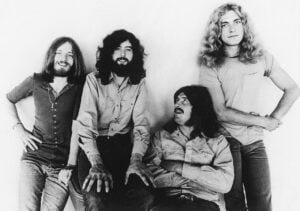Inside The Eagles’ Approach to Music and Popularity

via James Maharaj / YouTube
The Eagles are among the most successful bands in music history, but they once admitted feeling uneasy about their music becoming too widely popular. Despite selling millions of records, winning Grammy Awards, and topping charts, the band preferred to see themselves as underdogs rather than mainstream darlings. They explained why they viewed being overly adored by the general public as a potential downside.
The Eagles’ Desire to Stay ‘Underdogs’
In the 1970s, The Eagles quickly rose to fame—their debut album boasted three Top 40 hits. While many artists dream of this level of success, the band didn’t want their music to become too accessible or mainstream. They viewed widespread popularity with some suspicion.
“Mass appeal is definitely suspect,” Glenn Frey told Rolling Stone in 1975. “Just look at our Grammy winners, Stevie Wonder aside. Sometimes mass appeal just means you dumbed down your music to the lowest common denominator. It’s tempting to think, ‘Well, they’ll buy this.’ No one ever went broke underestimating the intelligence of the mass public.”
Frey echoed the thoughts of cultural critic H.L. Mencken, known for his elitist views, but his bandmate Don Henley disagreed.
“It’s not a crime to be in the Top 40,” Henley argued. “Look at Paul Simon and Joni [Mitchell]. They sell millions of records.”
Despite this, Frey was clear: he wanted his music to have genuine meaning.
“It must be strange to sell a ton of records and make lots of money from something that didn’t mean a damn thing,” he said. “I never want to face that.”
Success vs. Artistic Integrity
The band acknowledged that success sometimes interfered with creativity.
“It seems to take more effort every year to forget the grind of touring and recording and get to a place where creativity flows naturally,” said guitarist and singer Bernie Leadon.
They even wrote songs reflecting their disillusionment with fame, like “After the Thrill is Gone.” Henley’s original title for the track was “Here’s Another Hidden Commentary on the Music Business Disguised as a Love Song.”
In their early days, they could create freely, but success forced them to treat music as a business.
“It’s a damn business. A profession,” Henley said. “And it’s tough. A 9-to-5 job might be just as demanding, but at least those workers can leave it behind after work. This is 24/7. It’s like cramming 60 years into 28. As Joe Walsh says, ‘You burn the candle at both ends/Twice the light in half the time.’ But at least we’re doing what we want.”
Confidence Amid Caution
Though wary of fame’s impact, they still took pride in their accomplishments.
“I’m starting to feel proud we’ve made it through three albums,” Henley said. “I feel like a trooper, like we finally have a place in the big rock scene.”
He was also confident about their continued success.
“The key question now is whether we’ll make a better album than the last one,” he said. “But whatever we do, it’ll be gold within a few weeks.”














